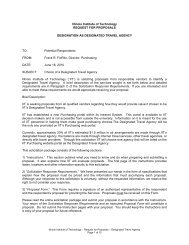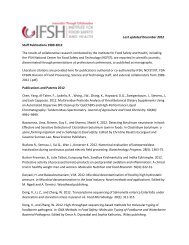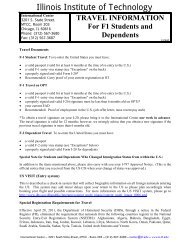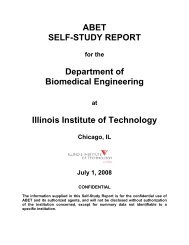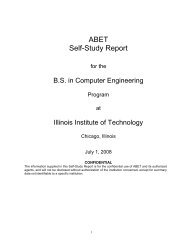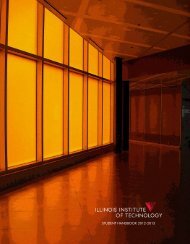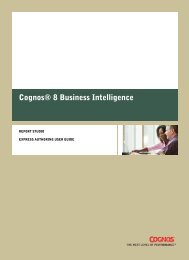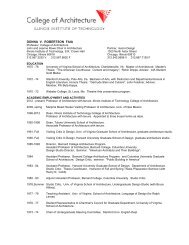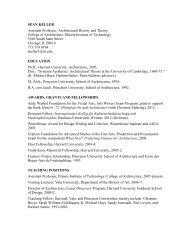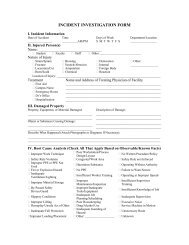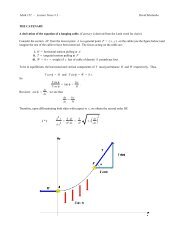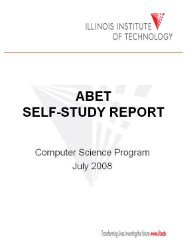Undergraduate Bulletin - Illinois Institute of Technology
Undergraduate Bulletin - Illinois Institute of Technology
Undergraduate Bulletin - Illinois Institute of Technology
You also want an ePaper? Increase the reach of your titles
YUMPU automatically turns print PDFs into web optimized ePapers that Google loves.
Computer Science<br />
Computer Science<br />
Department Website: www.iit.edu/csl/cs<br />
Stuart Building 235<br />
10 W. 31st St.<br />
Chicago, IL 60616<br />
312.567.5150<br />
Chair<br />
Xian-He Sun<br />
Associate Chair<br />
Bogdan Korel<br />
Associate Chair<br />
Cynthia Hood<br />
Director <strong>of</strong> <strong>Undergraduate</strong> Programs<br />
Matthew Bauer<br />
Computers have changed what we do and how we do<br />
it-in our homes, in our <strong>of</strong>fices, and throughout our world.<br />
The discipline <strong>of</strong> computer science focuses upon the many<br />
challenging problems encountered in the development and<br />
use <strong>of</strong> computers and computer s<strong>of</strong>tware. Areas <strong>of</strong> study in<br />
computer science range from theoretical analyses into the<br />
nature <strong>of</strong> computing and computing algorithms, through<br />
the development <strong>of</strong> advanced computing devices and computer<br />
networks, to the design and implementation <strong>of</strong> sophisticated<br />
s<strong>of</strong>tware systems.<br />
The department <strong>of</strong>fers two undergraduate programs in<br />
computer science: a Bachelor <strong>of</strong> Science (B.S.) in Computer<br />
Science and Bachelor <strong>of</strong> Science (B.S.) in Computer<br />
Information Systems. Both programs provide an excellent<br />
background in computer science and allow for ample<br />
study in other areas. Where these programs differ is in<br />
the approach they take to computer science. The B.S. in<br />
Computer Science provides an in-depth experience focusing<br />
on the theory and practice <strong>of</strong> computer science while the<br />
B.S. in Computer Information Systems provides a more<br />
interdisciplinary experience, balancing study in computer<br />
science with study in another field.<br />
Each graduate <strong>of</strong> the B.S. in Computer Science program<br />
should be able to:<br />
• Apply knowledge <strong>of</strong> computing and mathematics appropriate<br />
to the discipline.<br />
• Analyze a problem, and identify and define the computing<br />
requirements appropriate to its solution.<br />
• Design, implement, and evaluate a computer-based system,<br />
process, component, or program to meet desired<br />
needs.<br />
• Function effectively on teams to accomplish a common<br />
goal.<br />
• Have an understanding <strong>of</strong> pr<strong>of</strong>essional, ethical, legal,<br />
security, and social issues and responsibilities.<br />
• Communicate effectively with a range <strong>of</strong> audiences.<br />
• Analyze the local and global impact <strong>of</strong> computing on<br />
individuals, organizations, and society.<br />
• Recognize the need for, and an ability to engage in,<br />
continuing pr<strong>of</strong>essional development.<br />
• Use current techniques, skills, and tools necessary for<br />
computing practices.<br />
• Apply mathematical foundations, algorithmic principles,<br />
and computer science theory in the modeling and<br />
design <strong>of</strong> computer-based systems in a way that demonstrates<br />
comprehension <strong>of</strong> the trade<strong>of</strong>fs involved in design<br />
choices.<br />
• Apply design and development principles in the construction<br />
<strong>of</strong> s<strong>of</strong>tware systems <strong>of</strong> varying complexity.<br />
• Be prepared to enter a top-ranked graduate program in<br />
computer science.<br />
Both programs begin with a set <strong>of</strong> introductory courses that<br />
work together to provide students with a firm foundation<br />
in computer science. These introductory courses include<br />
weekly labs in which students use state-<strong>of</strong>-the-art s<strong>of</strong>tware<br />
development techniques (object-oriented programming in<br />
C++ or Java, for instance) to create solutions to interesting<br />
problems. The department’s unique four-phase laboratory<br />
model encourages student creativity by providing ample<br />
opportunity for constructive feedback on each student’s<br />
efforts. Having completed the introductory core, a student<br />
is prepared to work independently within a well-structured<br />
design framework – in the classroom or on the job.<br />
The last two years <strong>of</strong> study build upon this foundation.<br />
The B.S. in Computer Science focuses on the concepts<br />
and techniques used in the design and development <strong>of</strong> advanced<br />
s<strong>of</strong>tware systems. Students in this program explore<br />
the conceptual underpinnings <strong>of</strong> computer science–its fundamental<br />
algorithms, programming languages, operating<br />
systems, and s<strong>of</strong>tware engineering techniques. In addition,<br />
students choose from a rich set <strong>of</strong> electives including computer<br />
graphics, artificial intelligence, database systems,<br />
computer architecture, and computer networks, among<br />
others. As with the introductory sequence, these advanced<br />
courses stress “hands-on” learning by doing. A generous<br />
allotment <strong>of</strong> free electives allows students to combine study<br />
in computer science with study in another field – either by<br />
taking a well-defined specialized minor in another discipline<br />
or by working with an advisor to formulate a program that<br />
combines experiences across disciplines.<br />
The B.S. in Computer Information Systems program emphasizes<br />
the use <strong>of</strong> computers as sophisticated problemsolving<br />
tools. Students in this program pursue an interdisciplinary<br />
course <strong>of</strong> study that combines a solid foundation<br />
in computer science with a focus in another discipline. This<br />
program is designed for students who seek to blend their<br />
computer science abilities with skills specific to another<br />
domain to solve problems in that domain. Examples include<br />
computing with a business focus (e.g., management<br />
information systems) or computing with a natural science<br />
focus (e.g., computational physics).<br />
88



